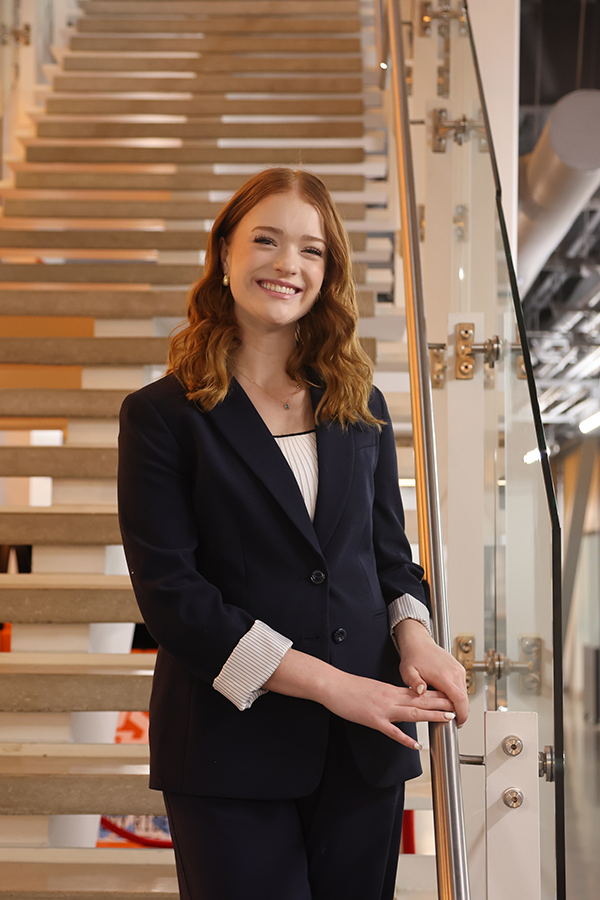
Mechatronics and robotics major developing immersive language-learning technology
Wednesday, January 22, 2025
Media Contact: Tanner Holubar | Communications Specialist | 405-744-2065 | tanner.holubar@okstate.edu
Aubrey Fudge has a passion to help close gaps in education, especially in language learning.
After living in Germany for a year and a half in high school, she realized the most effective way to learn a language is to immerse oneself in it. Now as a student in the College of Engineering, Architecture and Technology, she is developing a way for people to immerse themselves in language learning.
Fudge, a mechatronics and robotics major in the Division of Engineering Technology was born and raised in Oklahoma City. But it was her time living in Europe where she developed the idea for Lingua, a language-learning platform designed to overcome shortcomings of traditional language education.
In many cases, especially in the United States, language education has involved memorization and repetitive exercises. Lingua combines artificial intelligence and virtual reality to create an immersive, hands-on environment where users are put in real-world scenarios where they can practice a new language.
“After living overseas, I realized that immersion was the most effective way to truly learn a language — something I hadn’t experienced through traditional methods like high school education or language apps,” she said. “In Europe, multilingualism is common, yet in the U.S., many people remain monolingual despite years of language study. This sparked my passion to create Lingua — an innovative platform that aims to strengthen language education in the U.S. and make it more accessible and impactful.”
Fudge said her dynamic approach can boost skill acquisition, improve engagement and enhance retention by up to 60%; thus making learning faster, more effective and more fun. She feels it has the potential to reshape language education across the country, where proficiency in secondary languages lags behind other countries.

“Perhaps most importantly, Lingua can help close the educational and economic gaps between private, public and homeschool students by providing equitable access to immersive language tools,” Fudge said. “Offering low-cost or subsidized versions of Lingua would empower low-income families and underserved communities, giving students a fairer chance at succeeding in higher education and securing competitive jobs.”
She has worked alongside Harrison Confer, a finance and accounting major in the Spears School of Business, with Fudge handling software development and Confer leading investor initiatives and gathering interested groups for beta testing. There is a goal to get Lingua off the ground and into schools for beta testing once it has gone through the first few stages of development.
Lingua is designed like an immersive, adventure-style game where users finish tasks to advance. It features a chameleon who follows the user as a companion and changes colors as users progress.
Users interact with AI-based non-playable characters adapted to the user’s language skills, which enables real-world conversations.
“This combination of engaging gameplay and adaptive conversation practice makes learning both fun and effective,” Fudge said.
Rewarding entrepreneurship
The Riata Center for Innovation and Entrepreneurship at OSU promotes experiential learning as well as provides competitions for students to present their business ideas.
Fudge took part in Riata’s Pitch and Poster Competition in November, earning first place in the High Tech category and receiving a $1,000 scholarship.
It was a new and enjoyable experience for Fudge that also led to her being a finalist for the 2025 Business Proposal Competition put on by the Riata Center.
“I got to receive helpful criticisms about my idea and my plan as well as experience in public speaking,” she said. “I’m excited to be competing in similar competitions in 2025."
After graduation she plans to focus on Lingua or pursue a career in industry, such as working for a space research company or a company with a robotics sector.
Fudge credits Dr. Joe Conner, an adjunct assistant professor in MAE and a matrixed professor in ENDEAVOR, as being an influence on her growth as an engineer. Conner is also advisor of CEAT SOLVERS, which Fudge is heavily involved in. CEAT SOLVERS provides students with opportunities to take part in research, present research and network.
“I hope to continue to learn under him this next semester on the BB-8 interactive tour droid project for CEAT,” Fudge said. “On the student side, my fellow officers and members of CEAT SOLVERS have been a huge inspiration. I truly consider each of them a mentor. Specifically, Tyler Graham, Charles Bruce, Toby Mears and Andrew Fawcett have taught me the importance of continuous learning and always striving for greatness, no matter how niche the subject.”
She said a major aspect of her success has been having a strong support network and being surrounded by others who challenge her. Being able to collaborate with others has kept her motivated and helped her learn it is OK to seek out help, especially with balancing a difficult major and being involved in many different things.
“It’s tough, but it’s possible with the right mindset,” Fudge said. “The key is prioritizing and recognizing that balance doesn’t mean giving equal time to everything. Set clear, meaningful goals for yourself, whether academic or personal, and make decisions that align with your larger vision.
“For me, focusing on how I could use my skills to make an impact helped me stay grounded when things got hectic. Once you know your, ‘why,’ it’s easier to navigate the stress and find time for what matters.”
Fudge is looking to expand her team, either through student or professor assistance. Anyone interested in becoming part of her team can email her at aubrey.fudge@okstate.edu.
